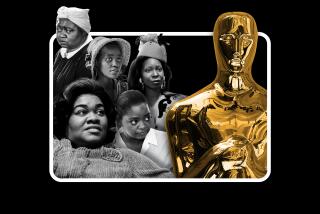Worth All the Begetting
To see “Beloved,” all two hours and 52 minutes of it, is to understand at once all its confounding contradictions. Visible is both why it took 10 years to reach the screen and why star and driving force Oprah Winfrey would not, could not rest until it happened. Visible as well are the difficulties of translating a spectacular work of fiction into film and the bounty that can be gained by those determined to persevere.
Directed by Jonathan Demme, “Beloved” is ungainly and hard to follow at times, like the proverbial giant not quite sure how to best use its strength. But that power exists, present and undeniable, and once this film gets its bearings, the unsentimental fierceness of its vision brushes obstacles and quibbles from its path.
Already a modern classic, “Beloved” the novel was awarded the Pulitzer Prize and was critical to author Toni Morrison’s receiving the Nobel Prize in literature. Set just before and just after the Civil War and telling the story of Sethe(Winfrey), the survivor of an unspeakable hell for whom “the future was a matter of keeping the past at bay,” it deals as potently as only fiction can with the nightmare legacy of slavery and the deadly, terrifying weight of the past.
Yet as devastating as the book is, its use of a multilayered narrative, its complete acceptance of the supernatural plus its exceptional way with language add up to a story that seems to be too large and too poetic to fit comfortably into a film of any length.
“Beloved” is director Demme’s first feature since 1993’s “Philadelphia” and only his second since 1991’s Oscar-winning “The Silence of the Lambs,” and in some ways this film combines the social consciousness of the former with the facility for horror (and by extension the supernatural) of the latter. The work that has resulted, strange, troubling and powerfully imagined, is rough going at first, but the more time you spend with it the more the strength of the underlying material exerts its will.
“Beloved’s” screenplay (credited to Akosua Busia and Richard LaGravenese and Adam Brooks) takes the sane way out, paring the book down to its essential events, most of which take place in 1873 in and around a small house on the outskirts of Cincinnati. What’s been sacrificed is the book’s extended look at life at Sweet Home, the ironically named Kentucky plantation where the horrors begin, though the flashbacks that are shown (shot by longtime Demme cinematographer Tak Fujimoto on special, deliberately grainy film stock) are critical to the film’s impact.
*
All this, however, takes awhile to unfold. Initially, almost from its opening “Poltergeist, the Early Years” sequence--a chaotic, demonic night when a tormented dog called Here Boy gets tossed around, mirrors break and two young brothers flee for their lives--”Beloved” comes across as a film that knows its source so well it underestimates how confusing its events are to nonreaders.
The next scene reintroduces Sethe and her daughter Denver (Kimberly Elise) on a sunny day in 1873, eight years later. Coming up the road is a man Sethe hasn’t seen in 18 years, Paul D (Danny Glover), a friend from the prewar days at Sweet Home and an intimate of Halle, Sethe’s husband and Denver’s father, whom Sethe also hasn’t seen since the day in 1855 she precipitously fled the plantation.
Invited into their house, Paul D is unnerved to find a room filled with undulating, vibrating red light. It is, Sethe tells him matter-of-factly, the sad but not evil ghost of her baby daughter who died at the age of 2. It’s the same ghost that drove her two sons away eight years ago, the ghost that keeps neighbors from coming over and relieving the bleak isolation these women live in.
Paul D’s presence does two things. It precipitates a physical struggle with Baby Ghost, as Denver calls it, who apparently leaves, though Denver does say, “I think the baby ain’t gone, I think the baby got plans.” And having Paul D around leads Sethe to relive, and us to see in flashback, the agonies of her final night at Sweet Home.
What happens at Sweet Home, the multiple tortures inflicted on Sethe by the white men who run things, are painful, deeply difficult to watch even in the brief shards of flashback we’re given, and aesthetically problematical. What we see on screen, perhaps to protect our sensibilities, is shown in short, often frenzied bursts. When that frantic tone combines with the film’s determination to give its actors accurate accents, past events end up rushing by in a not completely comprehensible blur. In fact, to read Morrison’s novel after seeing the film is to frequently say, “So that’s what that was all about.”
Determined to bring some normalcy into Sethe and Denver’s lives, Paul D takes them to a local carnival. When they return home, however, they find in their front yard a beautiful, almost catatonic young woman whom we’ve seen emerge fully clothed and soaking wet out of a nearby stream. Asked her name, the woman croaks a single word in the deepest of voices: Beloved.
Partly young woman, mostly child, Beloved can’t or won’t say where she came from and has to learn from scratch what it is to act her age. She slobbers, drools, snores, eats sweets with a vengeance, and, though Denver is eager for her companionship, it is Sethe that Beloved is hungry for. As Morrison’s limpid prose notes, “Rainwater held on to pine needles for dear life and Beloved could not take her eyes off Sethe,” who in turn felt that “the company of this sweet, if peculiar guest pleased her the way a zealot pleases his teacher.”
With the appearance of Beloved, the film that’s her namesake comes fully alive, and Thandie Newton’s performance in the role is the largest part of the reason. Previously seen in “Flirting” and “Jefferson in Paris” among others, Newton hits the right unnerving notes with her work here. Pleading, screaming, importuning, her Beloved is a truly disconcerting, unfathomable presence that deeply troubles Paul D. It gives the film the critical sense of unease the book has, in effect freeing it to be itself.
Because her eerie, insinuating “Tell me” can’t be resisted, Beloved’s persistent questions lead Sethe to slowly recount even more of her past. We see how she escaped from Sweet Home, the circumstances of Denver’s birth, and how she got to Ohio and the comforting presence of her mother-in-law, the unchurched preacher Baby Suggs (Beah Richards). Sethe also gets closer and closer to her own terrible secrets as well as the hard truths that are in the possession of Beloved and Paul D.
It was Winfrey’s persistence as a producer that got “Beloved” made, and though her relative inexperience as an actress is visible, it turns out not to be a problem. Winfrey is convincing enough to make an impact with lines like Sethe’s “I will never run from another thing on this Earth, you hear!” declaration to Paul D; at other times, her untutored quality makes a good fit with the stoicism that is Sethe’s touchstone.
*
Winfrey is also helped by the excellent actors she’s surrounded with, starting with Glover as the soul of humanity Paul D and Elise as the troubled but striving Denver. Lisa Gay Hamilton is so convincing as the young Sethe you forget at times she’s not Winfrey, and Albert Hall effectively plays the pivotal role of Stamp Paid. Most satisfying of all, perhaps, is Richards, Oscar-nominated 30 years ago for “Guess Who’s Coming to Dinner,” who poignantly conveys the mystical, healing presence of Baby Suggs.
What finally pulls “Beloved” over the shoals of its initial awkwardness and uncertainty is the strength contained in its exceptional source material. By the time Paul D tells Sethe, “We got more yesterday than anybody, we need some kind of tomorrow,” we have gone through enough with them to calculate the cost of survival down to the last drop of blood.
* MPAA rating: R, for violent images, sexuality, nudity. Times guidelines: vivid, explicit scenes of rape and violence plus scenes of the supernatural.
‘Beloved’
Oprah Winfrey: Sethe
Danny Glover: Paul D
Thandie Newton: Beloved
Kimberly Elise: Denver
Beah Richards: Baby Suggs
Lisa Gay Hamilton: young Sethe
Albert Hall: Stamp Paid
A Harpo Films/Clinica Estetico production, released by Touchstone Pictures. Director Jonathan Demme. Producers Edward Saxon, Jonathan Demme, Gar Goetzman, Oprah Winfrey, Kate Forte. Executive producer Ron Bosman. Screenplay Akosua Busia and Richard LaGravenese and Adam Brooks, based on the novel by Toni Morrison. Cinematographer Tak Fujimoto. Editor Carol Littleton. Costumes Colleen Atwood. Music Rachel Portman. Production design Kristi Zea. Art director Tim Galvin. Set decorator Karen O’Hara. Running time: 2 hours, 52 minutes.
* In general release throughout Southern California.
More to Read
Only good movies
Get the Indie Focus newsletter, Mark Olsen's weekly guide to the world of cinema.
You may occasionally receive promotional content from the Los Angeles Times.










